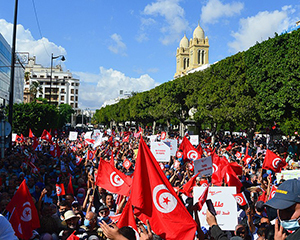Much of the research on the Arab Spring has focused on the socioeconomic causes that led to the protests, uprisings, and revolutions. Looking at the period after the fall of the dictators, most research has focused on the political transformation. And although grievances such as high unemployment and rising prices persisted, and protests also recurred, we have known little about the political economy during periods of political transformation. To fill this gap, the project “Struggles over Socioeconomic Reforms: Political Conflict and Social Contention in Egypt and Tunisia post 2011 in Interregional Comparison” conducted detailed case studies on Egypt and Tunisia. A themed section in the journal Mediterranean Politics, edited by project leader Dr Irene Weipert-Fenner, now summarizes the project’s findings.
For both countries, which had similar political-economic conditions but very different political developments until 2021, case studies on fiscal policy, labor law, and decentralization provided important insights into the consolidation of democracy (Tunisia) and autocracy (Egypt). Specifically, the study of conflicts around socioeconomic reforms helped identify the relevant actors, such as economic elites and unions, and their relative power in relation to the political elite at a given point in time. The analysis also showed how formal and informal institutions were used and whether the new institutional framework allowed for effective conflict management.
The findings are particularly important for the question of how Tunisia’s current re-autocratization could have come about. But the findings are also important for Egypt. Contrary to the myth of autocracies as efficient, assertive regime types, they show instead that even extremely repressive regimes must secure the interests of important support groups, and that divergent interests here can lead to conflicts and severely limit the capacity for reform. In general, then, a mixed picture emerges regarding the capacity to implement reforms, which cannot be explained solely by regime type or state performance. Instead, the explanatory power lies in a dynamic, relational, action-oriented approach to analyzing state and societal actors in issue-specific socioeconomic reform conflicts.
The project was carried out in collaboration with Dr Amr El Shobaki and Dr Nadine Abdalla from the Arab Forum for Alternatives in Egypt, and with Dr Bassem Karray, Dr Hamza Meddeb, and Rabeb Laabidi from the University of Sfax in Tunisia. The Volkswagen Foundation funded the project for four years.
The themed section papers have been published online first and are available on the Taylor & Francis Online website. To the introduction by Irene Weipert-Fenner
